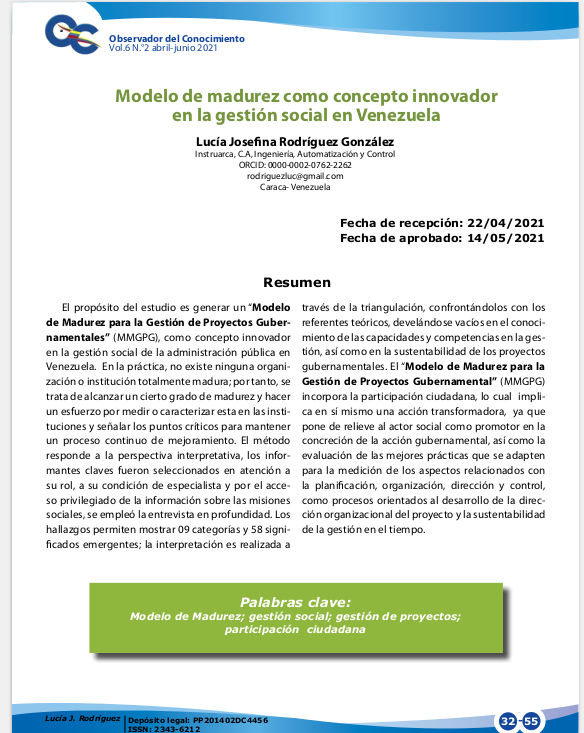Maturity Model as an innovative concept for social management in Venezuela
Keywords:
Maturity Model; social management; project management; citizen participationAbstract
The purpose of the study is to generate a Maturity Model for Government Project Management (MMGPG), as an innovative concept in the Social Management of public administration in Venezuela. In practice, there is no fully mature organization or institution; none could reach a state of maximum development. Therefore, it is a matter of reaching a certain degree of maturity and making an effort to measure or characterize this in the institutions and point out the critical points in order to maintain a continuous process of improvement. The method responds to the interpretative perspective, the key informants were selected according to their role, their specialist status and the privileged access to information on the Social Missions, the in-depth interview was used. The findings show 09 categories and 58 emerging meanings; the interpretation is carried out through triangulation, confronting them with the theoretical references, revealing gaps in the knowledge of management capacities and competencies, as well as in the sustainability of governmental projects. It is concluded with the maturity model for the Management of Governmental Projects (MMGPG) that incorporates the citizen participation which implies in itself a transforming action, which highlights the Social Actor as promoter in the concretion of the governmental action, as well as the evaluation of the best practices that are adapted for the measurement of the aspects related to the planning, organization, direction and control, as processes for the development of the organizational direction of the project and the sustainability of the management in the time.
Downloads
References
Association for Project Management (APM). (2017). APM Project Fundamentals Qualification. Chartered Body Project Profession. 7Th Edition. UK: APM Books.
Bascarán, E. (2010). Evaluación de la Aplicación de la Gerencia de Proyectos en Venezuela una posición pragmática de un paradigma. Caracas: Cuadernos UCAB Nº8.
Bellomusto, R. (2017). Innovación y Gestión Estratégicas de Proyectos. México: Ediciones Cengage.
Bertalanffy, L. V. (1976). Teoría general de los sistemas. México: Fondo de Cultura Económica.
Boulding, K. (1956). General Systems Theory: The skeleton of science. NY, USA: Jhon Willey & Sons.
Cisterna, F. (2005). Categorización y Triangulación como procesos de validación del conocimiento en Investigación Cualitativa. Chile: Theoria, Universidad del BIO BIO.
D’Elia, Y., Cabezas, L. (2008). Las Misiones sociales en Venezuela: Una aproximación a su comprensión y análisis. Caracas: ILDIS.
Diez, H., Pérez, M., Gimena, F. y Montes, M. (2012). Medición del desempeño y éxito en la dirección de proyectos. Perspectiva del Manager Público. Colombia: Revista Escuela de Administración de Negocios. Número 73. Universidad EAN.
Estay, Ch. (2007). Ingeniería de proyectos: proyectos, paradigma sistémico y gestión de proyectos. En Tesis Doctoral “Rigor y relevancia, perspectivas filosóficas y gestión de proyectos de Investigación-Acción en Sistemas de Información. España: Universidad Internacional de Cataluña.
Gigch, John P. V. (1987). Teoría General de Sistemas, México: Editorial Trillas.
Kerzner, H. (2000). Project Management. A Systems Approach to Planning, Scheduling, and Controlling. USA: Wiley Editions.
Luhmann, N. (1991). Sistemas Sociales. Lineamientos para una teoría general. Barcelona, España: Anthropos Editorial.
Massé, C. (2003). El Sistema de la Educación en Luhman desde una Perspectiva Crítica. México: Universidad Autónoma del Estado de México.
Merlino, A. (2009). Investigación Cualitativa en Ciencias Sociales. Temas, Problemas y Aplicaciones. Colombia: Revista Investigaciones en Educación, Vol XIII, Nº1. 191-197.
Monasterios D. (2013). La Última Frontera de La Gerencia, Aportes para la Construcción de una Teoría desde el Pensamiento Emergente. Caracas, Venezuela: Universidad Nacional Experimental Politécnica de la Fuerza Armada Nacional.
Moro, T. (2006). Utopía. Madrid: Ediciones Mestas.
Organización Internacional de Normalización (ISO). (2017). ISO.10006:2017(es). Gestión de la Calidad-Directrices para la Gestión de la Calidad en Proyectos. USA: ISO.
Patton, M. (2002). Qualitative research and Evaluation Methods. Los Angeles, USA: Sage Ediciones.
Project Management Institute. (2017). Organizational Project Management Maturity Model (OPM3). Knowledge Foundation. USA: PMI.
Project Management Institute. (2017). Guía de los Fundamentos para la Dirección de proyectos (PMBOK). USA: PMI.
Ricoeur, P. (2009). Teoría de la Interpretación. Discurso y Excedente de Sentido. Madrid, España: Siglo Veintiuno Editores.
Schettini, P. (2015). Análisis de Datos Cualitativos en la Investigación Social. Argentina: Editorial de la Universidad de la Plata.
Schutz, A. (1932). Fenomenología del mundo social. Barcelona, España: Editorial Paidós.
Schutz, A. y Luckmann, Th. (1973). Las estructuras del Mundo de la Vida. España: Amorrortu Editores.
Torres-Melo, J. y Santander, J. (2013). Introducciòn a las políticas públicas, conceptos y herramientas desde la relación entre Estado y Ciudadanía. Bogotá, Colombia: IEMP Ediciones.
Yuren, C. y María, T. (2000). Leyes, Teorías y Modelos. Caracas, Venezuela: Editorial Trillas.

Downloads
Published
How to Cite
Issue
Section
License
Copyright (c) 2023 Lucía Rodríguez

This work is licensed under a Creative Commons Attribution-NoDerivatives 4.0 International License.







